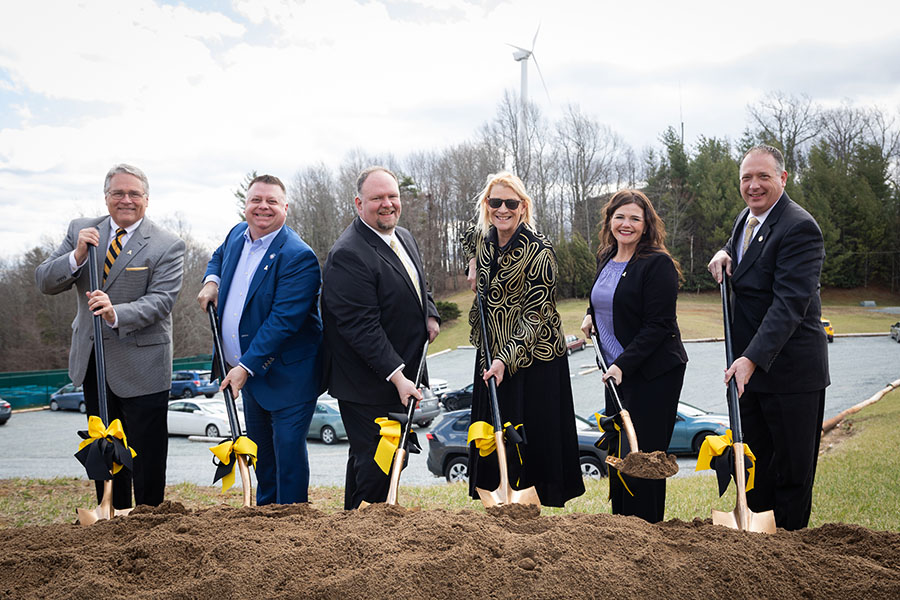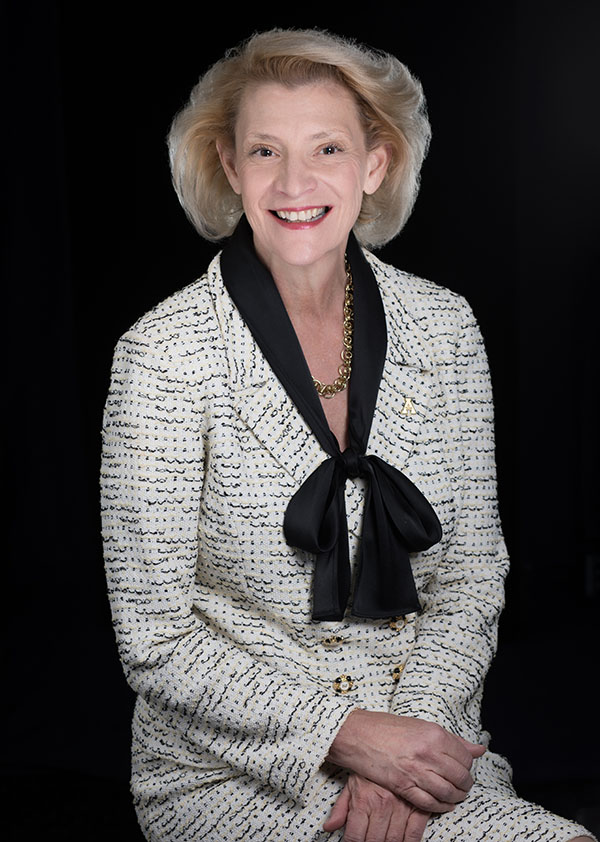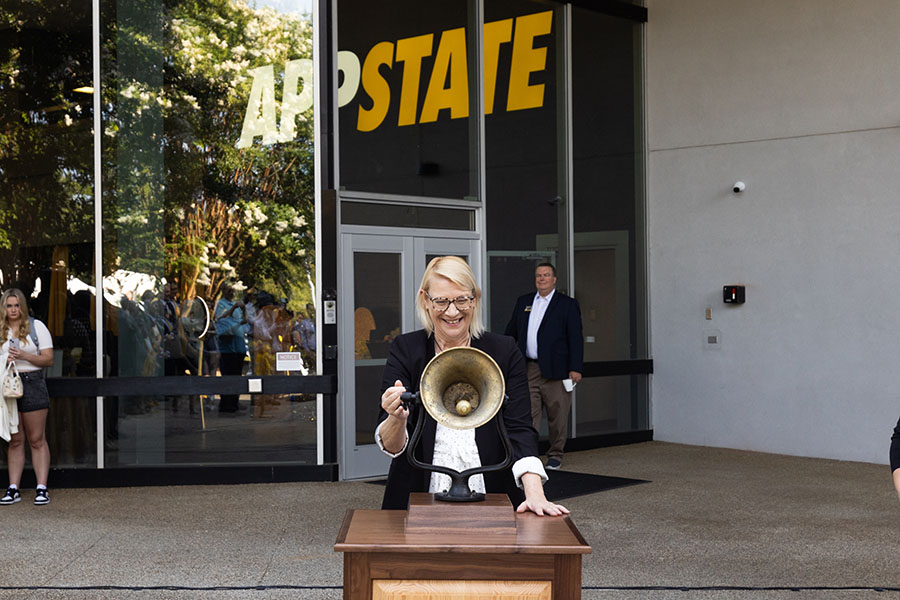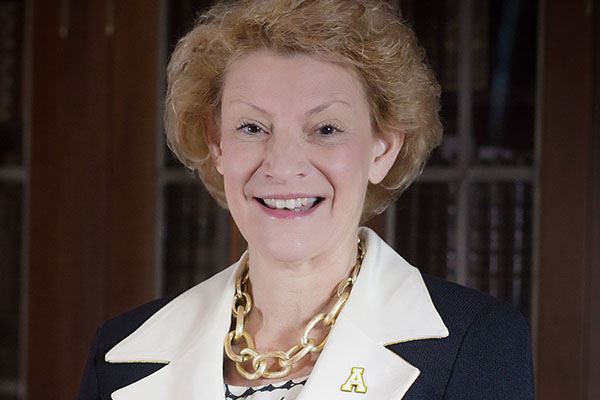BOONE, N.C. — After 10 years as Chancellor of Appalachian State University, Dr. Sheri Everts announced she is stepping down, effective April 19.
In a message to students, faculty and staff on April 15, Everts said, “Over the last few months, I have been experiencing significant health challenges, and I must now focus on my personal health and wellbeing.”
“The last decade has been a time of growth and momentum for Appalachian State,” said University of North Carolina System President Peter Hans. “Chancellor Everts welcomed a record number of students, celebrated numerous academic and athletic accomplishments, and led a physical transformation of the beautiful Boone campus. A new investment in Hickory builds on App State’s commitment to public service, and generations of North Carolinians will find great opportunity close to home because of Chancellor Everts’ vision. I’m very grateful for her devoted service.”
Hans said he would announce an interim chancellor for the university by April 19.
Everts became App State’s eighth leader in 2014. During her 10-year term, enrollment grew to more than 21,000, and she secured more than $550 million for capital projects for the university, representing one of the largest infrastructure investments in the entire UNC System. State-of-the art residence halls, academic facilities and athletics facilities have changed the face of the university in the last decade.
Since Everts’ arrival at App State, overall enrollment has increased by nearly 16%. In fall 2023, the university enrolled more than 21,000 students, including its most diverse student body to date, with 19% of the total population being racially and/or ethnically underrepresented students. From 2014-2024, App State increased its underrepresented students by 77% and first-year underrepresented students by 117%. Approximately one-third of the university’s undergraduate students are from rural areas and one-third are first-generation college students.
App State experienced record fundraising under Everts’ leadership. In the last fiscal year, the university raised more than $40 million, following a year that saw the largest cash fundraising in university history, at $31million. Since 2014, App State’s endowment has grown to $150 million, more than doubling in value. For the current fiscal year, the university is on track to have most successful fundraising year in institutional history.
“I am incredibly proud of the growth and development of the university over the last 10 years, and I look forward to seeing the development of the Innovation District and the Hickory Campus, in particular, and the many ways the region will continue to thrive with the benefit of these important state resources,” said Everts in her campus message.
In 2022, Everts broke ground on the first phase of the university’s Innovation District, which is expected to have a lasting and powerful impact on the region, broadening economic development opportunities for rural areas in Northwestern North Carolina, bringing together expertise across disciplines and facilitating collaborations on campus and with communities across the region. The district’s first phase will include a Conservatory for Biodiversity Education and Research, 156 faculty and staff housing units — consisting of one-, two- and three-bedroom configurations in five multistory buildings to help meet App State employees’ housing needs — and a zero-carbon district energy system with renewable energy technologies that will begin to transition the Boone campus away from steam power.
Everts expanded educational access in Western North Carolina with the opening of the App State Hickory campus to students in 2023. Until Nov. 19, 2021, when App State purchased the former Corning Optical Communications building located along Highway 321, Hickory was the largest metropolitan area in North Carolina that did not have a public university campus. More than 100 undergraduate majors, as well as on-site student support services and resources, are available at the Hickory campus.
Seeking innovative and effective ways to increase critical workforce degrees, Everts secured a $9 million grant from Banfield Pet Hospital and introduced a four-year veterinary technology degree program, which launched in fall 2023.
In recent years, she oversaw the opening of the Kidd Brewer Stadium north end zone facility; the renovation of Sanford Hall, an expansion of App State’s Child Development Center; and four new residence halls and a parking deck as part of the university’s three-phase student housing project, which replaced nearly 1,800 outdated beds and added 500 more. A new parking deck adjacent to the Holmes Convocation Center, which will open in summer 2024, will add 460 new spaces and better wheelchair accessibility for the building.

Appalachian State University Chancellor Sheri Everts, third from right, is joined by members of the North Carolina General Assembly for the Innovation District groundbreaking ceremony, held March 25 at the top of Bodenheimer Drive. Pictured with Everts, from left to right, are Rep. Kelly Hastings, Rep. Jason Saine, Sen. Ralph Hise, Sen. Deanna Ballard and Rep. Ray Pickett. Photo by Chase Reynolds
In 2021, she established a two-week, intensive summer institute for academic department chairs, offering opportunities for relationship building and meaningful, engaging conversation with one another — as well as with the Chancellor and members of her leadership team. The institute has provided for in-depth discussions about key strategic initiatives, with topics ranging from funding for the university, to enrollment goals, to diversity and inclusion strategies, among others.
In 2018, Everts led the charge in opening the App State Academy at Middle Fork in Walkertown, North Carolina — which serves approximately 300 K–5 students with research-based practices, state-of-the-art literacy instruction and exemplary classroom instruction and administration.
In 2017, App State and Watauga County closed on the old Watauga High School property, now named Appalachian 105, in a transaction that included an exchange of the university’s Business Affairs Annex on State Farm Road. The exchange allowed for the county to have a contiguous recreation area and the ability to build a new, state-of-the-art, community recreation center and swim complex. The university’s acquisition of the Appalachian 105 property has allowed for the development of competition-grade venues for track, softball and tennis, with options for development that could include collaborative academic spaces, event space, parking, residence halls and additional recreation accommodations for students.
In 2016, Everts broke ground on the Levine Hall of Health Sciences, which was completed two years later. The five-story, 203,000-square-foot academic building was the first project funded by the Connect NC Bond, a bond approved by the citizens of North Carolina in 2016, and was built on a 9.2-acre parcel of land donated by the Appalachian Regional Healthcare System. Levine Hall is the largest academic building on App State’s Boone campus, and this important expansion has allowed the Beaver College of Health Sciences to develop new rural health care initiatives and additional clinical services to serve the people of North Carolina.
Everts established the Chancellor’s Innovation Scholars Program in 2016 to support App State faculty and staff in their research and practice related to the innovation of higher education. These scholars pursue diverse and groundbreaking projects and provide opportunities for students to gain meaningful research mentorship.
The Chancellor's Appalachian Leadership Development Program provides formal assistance and training to a diverse group of faculty and staff, selected through a competitive process each year. Since Everts established this program in 2015, 75 App State employees have benefited from the program, through exploration and development of their leadership capabilities.
App State’s solar vehicle team, Team Sunergy, began in fall 2013 as a class project to build a solar-powered golf cart and developed into an interdisciplinary team of App State students, faculty and staff working together to research and develop solar-powered race cars. It was institutionalized and funded by Everts — recognized as the team’s No. 1 fan. Since it began racing in the American Solar Challenge and Formula Sun Grand Prix in 2015, Team Sunergy has achieved podium finishes nearly every year, competing against teams from top research and engineering programs across the U.S.
“I thank the faculty for the incredible contributions they have made through their teaching, research and service over the last decade, and our staff, who are the heart and soul of the institution. Most of all, I am incredibly proud of our students, past and present, who bring our university to life, give us purpose, and make real and powerful differences in communities around the world,” said Everts.
A Nebraska native, Everts graduated from the University of Nebraska-Lincoln in 1980 with a bachelor’s degree in English instruction and secondary education. After teaching middle school and high school English in Kansas and Nebraska, she returned to UNL, where she earned a master’s degree in literacy education and English in 1991 and a doctorate in administration, curriculum and instruction in 1994.
Everts began her higher education career in 1994 as an assistant professor in the Department of Teacher Education at the University of Nebraska Omaha. Rising through the academic and administrative ranks at UNO, she was named assistant vice chancellor for academic and student affairs in 2000, promoted to associate vice president in 2003 and named interim senior vice chancellor for academic and student affairs in 2006. She served in that interim capacity until June 30, 2008, when she left Nebraska to become provost and vice president for academic affairs at Illinois State University. She also served as interim president at ISU.
What do you think?
Share your feedback on this story.
About Appalachian State University
As a premier public institution, Appalachian State University prepares students to lead purposeful lives. App State is one of 17 campuses in the University of North Carolina System, with a national reputation for innovative teaching and opening access to a high-quality, cost-effective education. The university enrolls more than 21,000 students, has a low student-to-faculty ratio and offers more than 150 undergraduate and 80 graduate majors at its Boone and Hickory campuses and through App State Online. Learn more at https://www.appstate.edu.














